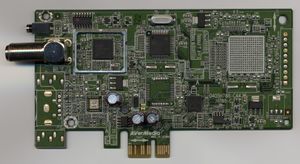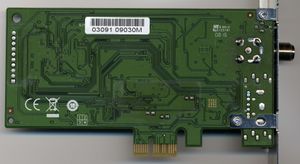AVerMedia AVerTV Bravo Hybrid PCI-E: Difference between revisions
Jump to navigation
Jump to search
HonYuenKwun (talk | contribs) (Add images) |
(Mv note about there being two versions to the lede. Label bare link.) |
||
| (8 intermediate revisions by 3 users not shown) | |||
| Line 1: | Line 1: | ||
[[ |
[[File:AVerMedia H788D Front.jpg|thumb|The front of an AVerMedia H788D, with interface chip and demodulator]] |
||
[[File:AVerMedia H788D Back.jpg|thumb|The back of an AVerMedia H788D]] |
|||
| ⚫ | The '''AVerMedia AVerTV Bravo Hybrid PCI-E''' is a series of [[ATSC]] [[ATSC PCIe Cards|PCIe cards]] from [[AVerMedia]]. There are two versions of the card: a hybrid card ('''H788''') which can handle ATSC, NTSC, and QAM, and a budget card ('''H788D''') that can only handle ATSC and QAM. Both are currently unsupported under Linux. |
||
It is currently unsupported under Linux. |
|||
== Overview/ |
== Overview/features == |
||
| ⚫ | |||
=== Components |
=== Components used === |
||
* PCIe interface chip: [[NXP SAA716x|NXP SAA7160ET]] |
|||
| ⚫ | |||
* Tuner: [[NXP TDA18271HD#TDA18271HD|NXP TDA18271HDC1]] |
|||
| ⚫ | |||
* [[NXP_SAA716x|NXP SAA7160ET]] |
|||
| ⚫ | |||
| ⚫ | |||
====H788D==== |
====H788D==== |
||
<code><pre> |
<code><pre> |
||
| Line 45: | Line 44: | ||
</pre></code> |
</pre></code> |
||
| ⚫ | |||
===Other Images=== |
|||
<gallery perrow=5> |
|||
Image:AVerMedia_H788D_Front.jpg|AVerMedia H788D front with interface chip and demodulator |
|||
Image:AVerMedia_H788D_Back.jpg|AVerMedia H788D back |
|||
</gallery> |
|||
| ⚫ | |||
=== Firmware === |
|||
=== Drivers === |
=== Drivers === |
||
* For SAA7160 development: <code>[http://jusst.de/hg/saa716x/ hg clone]</code> |
|||
* For LGDT3304 development: (driver already in upstream kernel) |
|||
For Development tree hg clone http://jusst.de/hg/saa716x/ |
|||
=== Sample Kernel Output === |
|||
''provide the relevant portion of dmesg here'' |
|||
===Remote Controller Support=== |
|||
==External Links== |
|||
* [http://www.avermedia-usa.com/AVerTV/Product/ProductDetail.aspx?Id=440 AverMedia H788 (MTVBHPCIR)] |
|||
* [http://www.avermedia-usa.com/AVerTV/Product/ProductDetail.aspx?Id=475 AverMedia H788D (MTVHDBRAR)] |
|||
[[Category:ATSC PCIe Cards]] |
[[Category:ATSC PCIe Cards]] |
||
Latest revision as of 00:34, 24 December 2016
The AVerMedia AVerTV Bravo Hybrid PCI-E is a series of ATSC PCIe cards from AVerMedia. There are two versions of the card: a hybrid card (H788) which can handle ATSC, NTSC, and QAM, and a budget card (H788D) that can only handle ATSC and QAM. Both are currently unsupported under Linux.
Overview/features
Components used
- PCIe interface chip: NXP SAA7160ET
- Demodulator: LGDT3304
- Tuner: NXP TDA18271HDC1
Identification
H788D
$ lspci -vvnn
03:00.0 Multimedia controller [0480]: Philips Semiconductors Device [1131:7160] (rev 03)
Subsystem: Avermedia Technologies Inc Device [1461:0755]
Control: I/O+ Mem+ BusMaster+ SpecCycle- MemWINV- VGASnoop- ParErr- Stepping- SERR- FastB2B- DisINTx-
Status: Cap+ 66MHz- UDF- FastB2B- ParErr- DEVSEL=fast >TAbort- <TAbort- <MAbort- >SERR- <PERR- INTx-
Latency: 0, Cache Line Size: 4 bytes
Interrupt: pin A routed to IRQ 11
Region 0: Memory at fd900000 (64-bit, non-prefetchable) [size=1M]
Capabilities: [40] MSI: Enable- Count=1/32 Maskable- 64bit+
Address: 0000000000000000 Data: 0000
Capabilities: [50] Express (v1) Endpoint, MSI 00
DevCap: MaxPayload 128 bytes, PhantFunc 0, Latency L0s <256ns, L1 <1us
ExtTag- AttnBtn- AttnInd- PwrInd- RBE- FLReset-
DevCtl: Report errors: Correctable- Non-Fatal- Fatal- Unsupported-
RlxdOrd+ ExtTag- PhantFunc- AuxPwr- NoSnoop-
MaxPayload 128 bytes, MaxReadReq 128 bytes
DevSta: CorrErr- UncorrErr+ FatalErr- UnsuppReq+ AuxPwr- TransPend-
LnkCap: Port #1, Speed 2.5GT/s, Width x1, ASPM L0s L1, Latency L0 <4us, L1 <64us
ClockPM- Surprise- LLActRep- BwNot-
LnkCtl: ASPM Disabled; RCB 128 bytes Disabled- Retrain- CommClk+
ExtSynch- ClockPM- AutWidDis- BWInt- AutBWInt-
LnkSta: Speed 2.5GT/s, Width x1, TrErr- Train- SlotClk- DLActive- BWMgmt- ABWMgmt-
Capabilities: [74] Power Management version 2
Flags: PMEClk- DSI- D1+ D2+ AuxCurrent=0mA PME(D0+,D1+,D2+,D3hot-,D3cold-)
Status: D0 NoSoftRst- PME-Enable- DSel=0 DScale=0 PME-
Capabilities: [80] Vendor Specific Information <?>
Capabilities: [100] Vendor Specific Information <?>
Making it work
Drivers
- For SAA7160 development:
hg clone - For LGDT3304 development: (driver already in upstream kernel)

